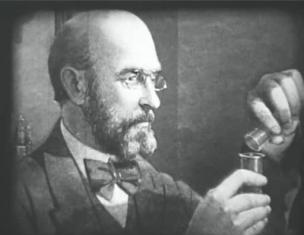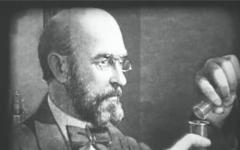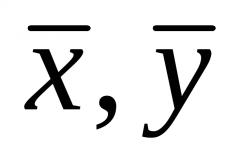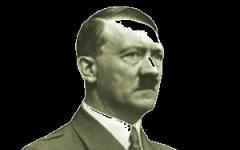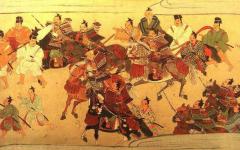Blok Alexander Alexandrovich (1880─1921) – Russian poet and writer, playwright and publicist, literary critic and translator. His work belongs to the classics of Russian literature of the twentieth century.
Parents
The poet's father, Alexander Lvovich, had German roots in his family; he was a lawyer by training, worked as an assistant professor at the department state law at the University of Warsaw.
The boy's mother, translator Alexandra Andreevna, had purely Russian roots, she was the daughter of a famous academician, rector of St. Petersburg state university Beketova A.N. Her family’s name was Asya and she was incredibly loved, firstly, because she was the youngest, and secondly, for her kindness, affection and very cheerful character. Most of all, Asya loved literature, especially poetry; perhaps this love was later passed on to the future poet at the genetic level.
Blok's parents met at a dance party. Asya made a strong impression on Alexander Lvovich, he fell in love and began to look for a meeting with the girl in every possible way, frequenting the Beketovs’ house, where receptions were held on Saturdays. The relationship between Asya and Alexander Lvovich developed quite quickly; at the beginning of 1879 they got married in the university church. The groom was 9 years older than the bride; on the wedding day they immediately left for Warsaw.
Alexander Lvovich loved his wife madly, but in life he turned out to be a despot and a tyrant, his love alternated with torment and bullying. Their first child was stillborn. The woman was desperately grieving and dreamed of giving birth to a second baby as soon as possible.
When Asya was pregnant for the second time, she and her husband came to St. Petersburg to defend his dissertation. We immediately settled in her parents’ house. Having received another academic degree, Alexander Lvovich Blok was returning to Warsaw alone. His wife's parents persuaded him to leave his wife with them, because in the eighth month of pregnancy it is unsafe to be afraid on trains.
Alexander Blok was born in the house of his grandfather Beketov. The boy was large and well-built; from the first day of his life he became the center of attention in the family. The father in Warsaw was immediately informed about the birth of his son. When he arrived in St. Petersburg for the Christmas holidays and stayed with the Beketovs, his whole despotic character was revealed to them. Everyone understood that Asya was hiding from her parents how she really lived with her husband.
Alexander Lvovich left alone again; it was decided that his wife, weakened by childbirth, and their tiny son would remain in their parents’ house until spring. But she never returned to her husband in Warsaw; her father insisted that her daughter and grandson remain in St. Petersburg.
The baby was restless and capricious; sometimes he could not be rocked to sleep for several hours. He fell asleep only in the arms of his grandfather, who walked with his grandson in his arms and at the same time prepared for lectures at the university.
Sashenka began to walk and talk late, but every summer spent in the village of Shakhmatovo improved his health. By the age of three, the boy was so handsome that passers-by could not pass by without looking back at the child.

Future poet In his character he inherited exactly half the traits of both his father and mother. Through the Blok line, Alexander inherited intelligence, depth of feelings and strong temperament. But along with these harsh traits, there were also Beketian sides in him; Alexander Blok was very generous, kind and childishly trusting.
Childhood years
The boy grew up playful and interesting, but very willful; it was almost impossible to dissuade him or teach him to do anything; his mother often had to punish Sasha.
To three years They couldn't find a suitable nanny for him. But then nanny Sonya appeared, who developed a special relationship with the child. Little Blok adored her; most of all, he liked it when the nanny read Pushkin’s fairy tales aloud to him.
He loved to play, and he absolutely did not need any companions; he was so keen on the game himself that he could run around the rooms all day long, pretending to be people, horses, or conductors. In addition to games and nanny's fairy tales, he had another strong hobby - ships, he drew them in different types and hung it all over the house, this passion remained with him for the rest of his life.
In the fourth year of his life, the boy first traveled abroad with his mother and nanny, to Trieste and Florence, where he swam a lot in the sea and sunbathed.
From there we returned to his beloved village of Shakhmatovo. While still a child, Blok studied all the surroundings here; later he would depict this place in his poem “Retribution.” He knew where mushrooms were found, lilies of the valley and forget-me-nots bloomed, where he could pick a whole basket of wild strawberries.

Little Sasha was madly in love with animals; yard dogs, hedgehogs, even insects and earthworms aroused his admiration. At the age of five, he dedicated his first poems to a gray bunny and a domestic cat.
His own father, Alexander Lvovich, came to Russia for the holidays and visited his son, but did not evoke much sympathy from the boy. The elder Blok was more concerned about getting his wife back, but she persistently asked for a divorce. Until he himself decided to remarry in Warsaw, he refused to grant a divorce.
And already in 1889, when Alexander Blok was nine years old, my mother married for the second time the lieutenant of the grenadier regiment Kublitsky-Piottukh. She took her husband’s surname, and her son remained Blok.
They moved to the Bolshaya Nevka embankment, there was a new apartment in the regimental barracks, where they lived for 15 years. The stepfather did not have any special love for his stepson, but he did not offend him either. The boy made friends with the neighboring children, and together they skated when the Nevka was covered with thick ice. At home he occupied himself with drawing and sawing, and he especially enjoyed binding books.
Gymnasium and university
In 1889, Sasha entered the Vvedensky gymnasium to study. Studying could not be called smooth, arithmetic was the worst, and he was very fond of ancient languages.
As a high school student, he was unsociable, did not like unnecessary conversations, and often wrote poetry in solitude.
Already at the age of ten he wrote two issues of the magazine “Ship”. And in the last years of the gymnasium I became together with cousins publish a handwritten magazine “Vestnik”. Grandfather occasionally helped his grandchildren illustrate the magazine. This publication contained poetry and prose of the young Blok, puzzles and riddles, translations from French, and even a small play “A Trip to Italy.” In one of the issues a fairy tale was published, where actors became beetles and ants. Blok mainly wrote humorous poems, but he also had a very touching poem dedicated to his mother.

Blok was not too keen on reading during his high school years, but he had favorite poets and writers:
- Zhukovsky and Pushkin;
- Jules Verne and Dickens;
- Cooper and Mine Reid.
In his senior year, Blok became interested in theater, recited Shakespeare, joined a theater club, and even had several roles in plays.
In 1897, Alexander, his mother and aunt, went to Germany, where his mother was undergoing treatment. This is where his first love happened. Ksenia Mikhailova Sadovskaya was a secular, beautiful and pampered lady of 37 years old, the mother of a family. The young man was immediately struck by her bottomless blue eyes; passion captured him and gave him poetic inspiration.
The beauty was the first to attract the inexperienced guy. Every morning he bought and gave her roses, they rode alone in a boat, and, of course, Blok dedicated to her his most touching poems that a young poet in love could write. He signed them “mysterious K. M. S.”
Returning to Russia, in 1898 Alexander graduated from high school. He immediately became a law student at St. Petersburg University. After three years of study, he transferred to the Faculty of History and Philology, choosing the Slavic-Russian department. In 1906, the poet graduated from the university.
Family life
In 1903, Alexander married Mendeleev’s daughter Lyubov.
They met a long time ago, back during summer holidays in the village where the Mendeleev estate was located next to Beketovskaya. He was 14 years old then, and Lyuba was 13, they walked and played together. Their second meeting took place when Blok had just graduated from high school; this time the young people made a completely different impression on each other.

While studying at the university, Blok often visited the Mendeleevs’ home, at which time his poems appeared, which were later included in the collection “Poems about a Beautiful Lady,” he dedicated them to his future wife Lyubov.
In the year of his marriage, another significant event took place in the poet’s life; his poems began to be published in the magazine “ New Path"and in the almanac "Northern Flowers". Blok’s creativity was quickly appreciated both in St. Petersburg and Moscow.
After the wedding, the young Blocks lived in his stepfather’s house, went to Moscow for a while, and in the summer they went to Shakhmatovo. Here they began to equip their family nest with their own hands. Alexander greatly respected physical labor, he even wrote in his poems about how he loved any work - “building a stove, writing poetry.” The blocks developed a luxurious garden, built a turf sofa in it, and often hosted guests. They were such a beautiful sunny couple among the wildflowers that they were even called the Princess and the Tsarevich.
They were each other's strongest loves of their lives. But their marriage turned out to be quite strange. Blok considered his wife the embodiment of Eternal femininity and did not admit that he could make carnal love with her. He had other women, Lyuba also had an affair with actor Konstantin Lavidovsky, from whom she became pregnant. Blok, who had been ill in his youth, could not have children, so he received the news of his wife’s pregnancy with joy that God would give them, free birds, a child. But this happiness was not destined to come true; the born boy died after living only eight days. Blok suffered this loss very hard and often visited the boy’s grave.
At the end of his life, the poet will say that there were two loves in his life - Lyuba and everyone else.

Creation
In 1904, the Grif publishing house published Blok’s first book, “Poems about a Beautiful Lady.”
The years 1906-1908 were marked by particular success and growth as a writer for Blok. He experienced all the events of the 1905 revolution through himself; he himself took part in demonstrations, which was reflected in a number of his works. His books come out one after another:
- "Unexpected joy";
- "Snow Mask";
- "Earth in the Snow";
- "Lyrical Dramas".
In 1909, the poet traveled through Germany and Italy, the result of this trip was the collection “Italian Poems”.
In 1912, he wrote the drama “Rose and Cross”, which was appreciated by V. Nemirovich-Danchenko and K. Stanislavsky, but this play was never staged.
In 1916, Blok served in the active army; he was assigned to Belarus in the engineering units of the All-Russian Zemstvo Union. During his service, he learned about the completed revolution, which he initially perceived with mixed feelings, but did not emigrate from the country.
This period includes such famous collections of poems as “Night Hours”, “Poems about Russia”, “Beyond Past Days”, “Gray Morning”.

Since 1918, Alexander was recruited to serve in the Extraordinary Investigative Commission, which investigated illegal actions officials. Here he worked as an editor.
Revolutionary events led to a deep creative crisis and depression for the poet. After the works “The Twelve” and “Scythians” he stopped writing poetry; in his words, “all sounds stopped.”
Illness and death
From 1918 to 1920, Blok worked a lot in various positions in committees and commissions. He was terribly tired, as the poet himself said, “I was drunk,” and his health began to decline sharply. Several diseases became worse at once: cardiovascular failure, asthma, scurvy, neurosis. On top of everything, there was a difficult time in the family financial situation.
In the middle of the summer of 1921, the poet began to have problems with his mind: he either fell into unconsciousness or came back to life again. All this time, his wife Lyuba looked after him. Doctors suspected he had cerebral edema.
On August 7, 1921, the poet Alexander Blok died in the presence of his wife and mother. He was buried at the Smolensk cemetery, and in 1944 his ashes were reburied at the Volkovskoye cemetery in St. Petersburg.
The Alexander Blok Museum-Reserve has been opened in Shakhmatovo, where a monument to the poet and his Beautiful Lady has been erected.
He amazed everyone with his irrepressible faith in the future of Russia and its people. Loving and suffering to embrace the immensity, a man with a wide soul and a tragic life. Blok's life and work deserve attention for their completeness and touchingness.
Biography of the poet
Blok Alexander Alexandrovich, born 1880, November 28. Place of birth - St. Petersburg. His parents: father - A.L. Blok, worked as a lawyer at the university in Warsaw, mother - A.A. Beketova, daughter of the famous botanist.
The boy's parents divorced before he was born, so he was unable to grow up in a complete family. However, maternal grandfather A.N. Beketov, in whose family Alexander grew up, surrounded the child with due care and attention. Gave it to him good education and a start in life. A.N. himself Beketov was the rector of the university in St. Petersburg. The highly moral and cultural atmosphere of the environment left its mark on the formation of Blok’s worldviews and upbringing.
Since childhood, he has had a love for the classics of Russian literature. Pushkin, Apukhtin, Zhukovsky, Fet, Grigoriev - these are the names on whose works little Blok grew up and became familiar with the world of literature and poetry.
Poet's training
The first stage of education for Blok was a gymnasium in St. Petersburg. After graduating in 1898, he entered St. Petersburg University to study law. He completed his legal studies in 1901 and changed his direction to historical and philological.
It was at the university that he finally decided to delve into the world of literature. This desire is also reinforced by the beautiful and picturesque nature, among which his grandfather’s estate is located. Having grown up in such an environment, Alexander forever absorbed the sensitivity and subtlety of his worldview, and reflected this in his poems. From then on, Blok’s creativity began.
Blok maintains a very warm relationship with his mother; his love and respect for her is limitless. Until his mother’s death, he constantly sent her his works.
Appearance

Their marriage took place in 1903. Family life was ambiguous and complex. Mendeleev was waiting for great love, as in novels. The block offered moderation and tranquility of life. The result was his wife’s passion for his friend and like-minded person, Andrei Bely, a symbolist poet who played an important role in the work of Blok himself.
Lifetime work
Blok’s life and work developed in such a way that, in addition to literature, he took part in completely everyday affairs. So, for example:
"Poems about a Beautiful Lady";
"Unexpected joy";
"Snowy Night"
"On the Kulikovo field."
“Retribution”, which he wrote like that.
was an active participant in dramatic productions in the theater and even saw himself as an actor, but the literary field attracted him more;
for two years in a row (1905-1906) the poet was a direct witness and participant in revolutionary rallies and demonstrations;
writes his own literature review column in the newspaper “Golden Fleece”;
from 1916-1917 repays his debt to the Motherland, serving near Pinsk (engineering and construction squad);
is part of the leadership of the Bolshoi;
upon returning from the army, he gets a job in the Extraordinary Investigative Commission for the Affairs of Tsarist Ministers. He worked there as a shorthand report editor until 1921.
Blok's early work
Little Sasha wrote his first poem at the age of five. Even then, he had the makings of a talent that needed to be developed. This is what Blok did.
Love and Russia are two favorite themes of creativity. Blok wrote a lot about both. However, on initial stage What attracted him most to the development and realization of his talent was love. The image of the beautiful lady, which he had been looking for everywhere, captured his entire being. And he found the earthly embodiment of his ideas in Lyubov Mendeleeva.
The theme of love in Blok’s work is revealed so fully, clearly and beautifully that it is difficult to dispute it. Therefore, it is not surprising that his first brainchild - a collection of poems - is called "Poems about a Beautiful Lady", and it is dedicated to his wife. When writing this collection of poems, Blok was greatly influenced by the poetry of Solovyov, whose student and follower he is considered to be.
In all poems there is a feeling of Eternal femininity, beauty, and naturalness. However, all expressions and phrases used in writing are allegorical and unrealistic. Blok is carried away in a creative impulse to “other worlds.”

Gradually, the theme of love in Blok’s work gives way to more real and pressing problems surrounding the poet.
The beginning of disappointment
Revolutionary events, discord in family relationships, miserably failing dreams of a clean and bright future for Russia force Blok’s work to undergo obvious changes. His next collection is called “Unexpected Joy” (1906).
More and more he ridicules the Symbolists, to whom he no longer considers himself, and he becomes more and more cynical about hopes for the best ahead. He is a participant in revolutionary events, who is completely on the side of the Bolsheviks, considering their cause to be right.
During this period (1906) his trilogy of dramas was published. First, “Balaganchik”, after some time “King in the Square”, and this trio ends with bitter disappointment from the imperfection of the world, from their disappointed hopes. During the same period, he became interested in actress N.N. Volokhova. However, he does not receive reciprocity, which adds bitterness, irony and skepticism to his poems.
Andrei Bely and other previously like-minded people in poetry do not accept the changes in Blok and criticize his current work. Alexander Blok remains adamant. He is disappointed and deeply saddened.
"The Incarnation Trilogy"
In 1909, Blok’s father dies, to whom he does not have time to say goodbye. This leaves an even greater imprint on his state of mind, and he decides to combine his most striking works, in his opinion, into one poetic trilogy, which he gives the name “Trilogy of Incarnation.”
Thus, Blok’s work in 1911-1912 was marked by the appearance of three collections of poems, which bear poetic titles:
A year later, he released a cycle of love poems “Carmen”, wrote the poem “The Nightingale Garden”, dedicated to his new hobby - singer L.A. Delmas.
Homeland in Blok's works

Since 1908, the poet has positioned himself no longer as a lyricist, but as a glorifier of his Motherland. During this period he writes poems such as:
"Autumn Wave";
"Autumn Love";
All these works are imbued with love for the Motherland, for one’s country. The poet simultaneously shows two sides of life in Russia: poverty and hunger, piety, but at the same time wildness, unbridledness and freedom.
The theme of Russia in Blok’s work, the theme of the homeland, is one of the most fundamental in his entire poetic life. For him, the Motherland is something living, breathing and feeling. Therefore, the events taking place are too difficult for him, disproportionately difficult. October Revolution.
The theme of Russia in Blok’s works
After revolutionary trends capture his entire spirit, the poet almost completely loses lyricism and love in his works. Now the whole meaning of his works is directed towards Russia, his homeland.
Blok personifies his country in poetry with a woman; he makes it almost tangible, real, as if he humanizes it. The homeland in Blok’s work takes on such a large-scale significance that he never writes about love again.
Believing in the Bolsheviks and their truth, he experiences severe, almost fatal disappointment for him when he sees the results of the revolution. Hunger, poverty, defeat, mass extermination of the intelligentsia - all this forms in Blok’s mind an acute hostility towards the symbolists, towards the lyrics and forces him from now on to create works only with a satiristic, poisonous mockery of faith in the future.
However, his love for Russia is so great that he continues to believe in the strength of his country. That she will rise up, dust herself off and be able to show her power and glory. The works of Blok, Mayakovsky, Yesenin are similar in this regard.
In 1918, Blok wrote the poem “The Twelve,” the most scandalous and loud of all his works, which caused a lot of rumors and conversations about it. But criticism leaves the poet indifferent; the emerging depression begins to consume his entire being.
Poem "Twelve"
The author began writing his work "The Twelve" in early January. On the first day of work, he didn't even take a break. His notes say: “Trembling inside.” Then the writing of the poem stopped, and the poet managed to finish it only on January 28.
After the publication of this work, Blok’s work changed dramatically. This can be briefly described as follows: the poet lost himself, stagnation set in.
The main idea of the poem was recognized differently by everyone. Some saw in it support for the revolution, a mockery of symbolist views. Some, on the contrary, have a satirical slant and mockery of the revolutionary order. However, Blok himself had both in mind when creating the poem. She is contradictory, just like his mood at that moment.

After the publication of “The Twelve,” all already weak ties with the Symbolists were severed. Almost all of Blok’s close friends turned their backs: Merezhkovsky, Vyach, Prishvin, Sologub, Piast, Akhmatova and others.
By that time, he himself was becoming disillusioned with Balmont. Thus, Blok is left practically alone.
Post-revolutionary creativity
The revolution passed, and the bitterness from the disappointment of the Bolshevik policies grew and intensified. Such a gap between what was promised and what was done as a result of the revolution became unbearable for Blok. We can briefly characterize Blok’s work during this period: nothing was written.
As they would later write about the poet’s death, “the Bolsheviks killed him.” And this is true. Blok was unable to overcome and accept such a discrepancy between word and deed new government. He was unable to forgive himself for supporting the Bolsheviks, for his blindness and short-sightedness.
Blok is experiencing severe discord within himself and is completely lost in his inner experiences and torment. The consequence of this is illness. From April 1921 to the beginning of August, the illness did not let go of the poet, tormenting him more and more. Only occasionally emerging from semi-oblivion, he tries to console his wife, Lyubov Mendeleeva (Blok). On August 7, Blok died.

Where did the poet live and work?
Today, Blok’s biography and work captivate and inspire many. And the place where he lived and wrote his poems and poems turned into a museum. From the photographs we can judge the environment in which the poet worked.
You can see the appearance of the estate where the poet spent time in the photo on the left.
The room in which the poet spent the last bitter and difficult moments of his life (photo below).

Today, the poet’s work is loved and studied, admired, his depth and integrity, unusualness and brightness are recognized. Russia in Blok's works is studied in school activities, essays are written on this topic. This gives every right to call the author a great poet. In the past, he was a symbolist, then a revolutionary, and at the end of the day he was simply a deeply disillusioned person with life and power, an unhappy person with a bitter, difficult fate.
A monument has been erected in St. Petersburg to perpetuate the author’s name in history and pay due respect to his undeniable talent.
(457 words) The junction of the 19th and 20th centuries was not without a significant phenomenon. He became Alexander Alexandrovich Blok, an epoch-making poet, bright star symbolism.
The poet was born in the union of Alexander Lvovich Blok and Alexandra Andreevna Beketova in 1880. The marriage of the private assistant professor and the rector's daughter was not destined to be happy, even the birth of a son did not improve the situation. Nine years later, Alexander’s parents officially divorced.
Blok's childhood years were spent abroad and on the outskirts of St. Petersburg. The future poet spent his summer in the Moscow region on his grandfather’s estate.
Education and creative path
Young Alexander Blok can best be described as a person distinguished by his breadth of knowledge and hobbies. Already at the age of five he began to compose poetry. The Vvedenskaya gymnasium admitted the boy straight into the second grade.
His literary talent required will, and fourteen-year-old Blok created the home magazine “Vestnik”. It was a kind of game that all family members were passionate about: mother, cousins, grandmother and grandfather. Alexander was attracted to the theater stage, but he was not destined to become an actor. In the year of his majority, he graduated from the Faculty of History and Philology.
Personal life and “Beautiful Lady”
At the age of seventeen, the young man was struck by love for the first time. But this feeling has one detail: his chosen one, Ksenia Sadovskaya, was the same age as Blok’s mother. This novel was initially doomed, but nevertheless became a red thread in the poet’s work.
Alexander’s first hobby shocked his mother, so in many ways she influenced his relationship with Lyubov Mendeleeva. The denouement of the new novel was an unsuccessful marriage. Blok’s reverence for his wife was combined with infidelity; he only admired her, but was not physically close, but he was looking for acquaintance with girls of easy virtue. The young woman herself also did not lag behind her husband. In the end, the couple reconciled, and Lyubov Mendeleev became the very Beautiful Lady to whom the poet dedicated a cycle of poems.
Creation
Since Alexander was a non-standard personality, his creative genius sided with symbolism. Everyday life, mysticism, everyday life and folklore - everything coexisted in his creations.
Alexander Alexandrovich was interested in all aspects of life: from thoughts about love and the beauty of nature to acute social problems. Metaphor added a special flavor to his work. Blok proved himself to be a wonderful poet, playwright and publicist.
Attitude to the revolution
Alexander Blok was one of the people who expected colossal changes from the revolution. He believed that what was happening should make life better, but revolutions love blood. The poet’s “childish” delight gave way to awareness and disgust.
We described this in detail using the example of his poem “12”. This work is a stain on the writer’s work. The hasty acceptance of the October Revolution prompted Blok to write it. The intelligentsia unanimously condemned the poem, as did the author himself, but later, when he asked before his death to destroy all copies of the book.
Death
Many factors influenced Blok's health. He was exhausted mentally and physically. In this regard, Alexander Alexandrovich experienced creative stagnation. “I was drunk,” the poet described his condition.
He needed a trip abroad, but was denied. Serious cardiovascular disease, accompanied by asthma and scurvy, was supported by mental disorders. The writer's heart stopped beating on August 7, 1921.
Interesting? Save it on your wall!
Alexander Alexandrovich Blok was born into a family where literature and art were revered in 1880. His parents separated early. Alexander was an only child, so he was pampered and raised by all his relatives on his mother’s side (she was a writer, and his grandfather was a university professor). Little Sasha loved to take part in home theater performances and read a lot. He began writing poetry at the age of five. He studied at the Vvedenskaya gymnasium, then received two higher education at St. Petersburg University.
The love of his life was Lyubov Dmitrievna Mendeleeva, the daughter of the famous chemist Dmitry Mendeleev. The cycle “Poems about a Beautiful Lady” was dedicated to her, one of the best poems of which begins like this: “I have a presentiment about you. The years pass by - sadly and lovingly...”. In these lines there is suffering about an impossible dream of beauty. This is a service to a woman, a hymn of dedication to her.. This is how one of the themes in Blok’s work was formed. Not everything went well in his family. The wife became a mother, giving birth to a son from Blok’s friend, writer Andrei Bely, but the child died. The Beautiful Lady turned into "Snow Mask." This is what Alexander Blok called a cycle of poems and the actress Delmas, whose theatrical roles seemed to him perfection.
The theme of love for a woman was not the only one in the work of Alexander Blok. He passionately loved the country in which he was born and raised, and therefore thirsted for “retribution” for its desecrated purity and majesty. It was his homeland that he called “wife” and believed in its great destiny. This is fully reflected in his poem “The Twelve,” in which twelve Red Army soldiers, like the twelve biblical apostles... establish justice through blood and suffering. Before us is a picture of post-revolutionary chaos. No one knows where to go and who to believe: the lady in karakul, having taken the ficus, shouts about “selling” Russia, the priest says that they betrayed the faith, the ditty Katka does not know to whom and how to sell herself... But at the end of the poem Jesus Christ appears “in the white corolla of their roses.” Blok looks to the future, listens to the music of the revolution and firmly believes in goodness. At the same time, Shakhmatovo, his estate, was ruined, the poet himself starved... and died in 1921 from heart failure. The fate of a great man is sad.
A short message about the life and work of Alexander Blok for children of 2, 3, 4, 5, 6, 7 classes
Date of birth of Alexander Blok, November 28, 1921.
Blok left his mark as a poet and playwright, as a participant and founder of symbolism. His literary legacy is the most striking phenomenon of Russian literature, which contributed to a huge influence on the literature of the whole world.
Alexander’s parents did not have a successful family; they separated almost immediately after their son was born. The boy’s upbringing was carried out by his mother’s family, which belonged to the professorial family.
In 1898, little Blok became a student at a gymnasium in St. Petersburg, after graduating he entered the university in the same city, the Faculty of Law, where he studied until 1901.
Blok's formation as a poetic personality took place under the influence of the classics. Blok began his creativity as a child. Alexander enjoyed the greatest recognition of Zhukovsky's romanticism; while reading it, Blok said about Zhukovsky that he was a singer of nature who managed to penetrate the innermost mysteries of nature. It was his works that became for the future poet and playwright nothing more than a teaching in the comprehension of beauty and world magic natural phenomena, as evidenced by the poet’s early work, namely the collection, collection, book, which was published in 1904. 
His works belonged to heightened symbolism, in which the poet contrasted sorrow with beauty, the holiness of the ideal with the promised. Which prompted the poet to call it nothing other than “Poems about a Beautiful Lady.”
Blok made his creative debut in 1905. It was at the beginning of the nineteenth century that the literary mood of society changed significantly. His poems absorbed social sensitivity, which the poet successfully manipulated in his creations, which brought recognition greater than in the pre-revolutionary period of his work.
And “Accidental Pride” glorified the poet even more; it was read and listened to at large meetings of writers. The collection "Unexpected Joy" includes almost all the poems from 1904 to 1906. Among them, the famous “Stranger”, “The Girl Sang in the Church Choir”, “Autumn Wave”.
Block, in short, with magical power poetic word captivated readers. And what was his work “Autumn Wave” worth? With the embodiment of the theme of the Fatherland, it subsequently became the goal of all his work. The poems contained lines about love for the Motherland, about its salvation, about the fact that living without the Motherland in a foreign land is unbearable. But the pre-revolutionary years made their own adjustments not only to Russian literature, but also to creativity

Blok, a short biography can highlight the emergence of a new word and such a new genre as theatrical action, which prompted the poet to create such famous dramas as “Stranger”, “The King on the Square”, “Balaganchik”.
A trip to Italy brought inspiration to the poet to write a whole cycle of Italian poems, which were collected and published in a collection called “Italian Poems” and “Carmen”.
In general, about Blok, we can briefly say that his poems were and will be the most subtle and lyrical, with the glorification of beauty and love. In 1921, Blok was struck down by illness, his condition constantly worsened, and on August 7 of this year his heart could not stand it and stopped.


